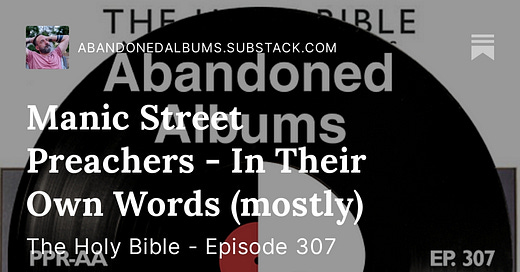NOTE: This episode contains talk about alcoholism, depression, and self-harm.
If you live in the United States, it’s possible that the Manic Street Preacher’s seminal third album, The Holy Bible isn’t only an abandoned album; the band could arguably be considered an abandoned band.
However, that’s not the case across the pond. In their native UK, they continue to rack up sales figures similar to their contemporaries like Radiohead. And this has always been the case:
Radiohead’s 1993 album Pablo Honey sold 1.5 million here in the US.
Manic Street Preachers 1994 The Holy Bible sold +/- 25,000 here in the US.
That’s a rather large difference, and while I like Pablo Honey… it’s not on the KRH go-to playlist.
The Holy Bible is.
Suffice it to say that even despite having a major label deal here in the United States, they never broke in any way here on this side of the pond.
That being said, when trying to infiltrate the largest and most coveted music market in the world, it may not have been in their best career interest to have a song called "Ifwhiteamericatoldthetruthforonedayit'sworldwouldfallapart" - or "If white America told the truth for one day it's world would fall apart."
After reading the cover story about Manic Street Preachers and this album in Mojo Magazine back in 2003-ish, I became enthralled first with the story of Richey Edwards and Manic Street Preachers and then the album, The Holy Bible.
It’s impossible to tell the story of The Holy Bible and not tell the story of Richey Edwards.
And that’s just what we do in this episode. Well, to be clear, we don’t do too much of the telling. Pulling audio from various radio and television interviews over the years, we let the band tell the story themselves.
In keeping with tradition, no spoilers here. If you don’t know the story, you’re in for a helluva ride.
The band - James Dean Bradfield (guitars, vocals), Nicky Wire (bass), Sean Moore (drums), and Richey Edwards (rhythm guitar) - emerged from Wales in 1986 and by 1988 had released their first single, “Suicide Alley.”
Eschewing the Ecstasy-fueled sound emerging from Manchester, the band was heavily influenced by the rock and roll of bands like Guns-n-Roses and Alice in Chains. Their sound and brash, bratty attitude earned them a solid and growing fan base in the UK and a loyal group here in the United States.
Both remain intact today.
Unfortunately, as their success grew, Richey Edwards began to take relief from alcohol abuse, self-harming, and anorexia. So much so that he was placed in a hospital during some of the recording of the band’s third album, The Holy Bible.
While he may have been absent from the recording itself, he commandeered almost all aspects of the album.
To get the full story, you can click on the link to the Mojo Magazine article, OR you can listen to this episode of Abandoned Albums.
The episode is included below and is available wherever you get your favorite podcasts.







